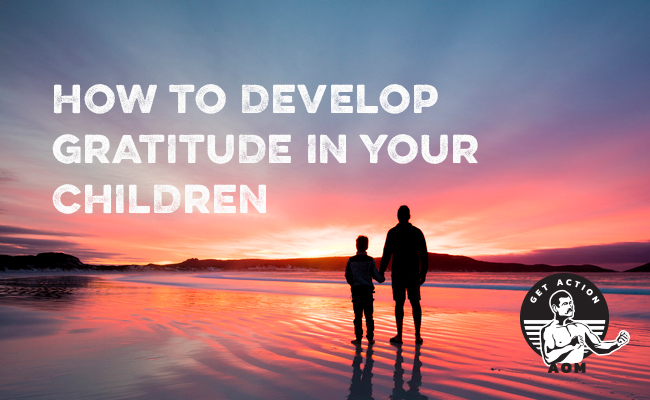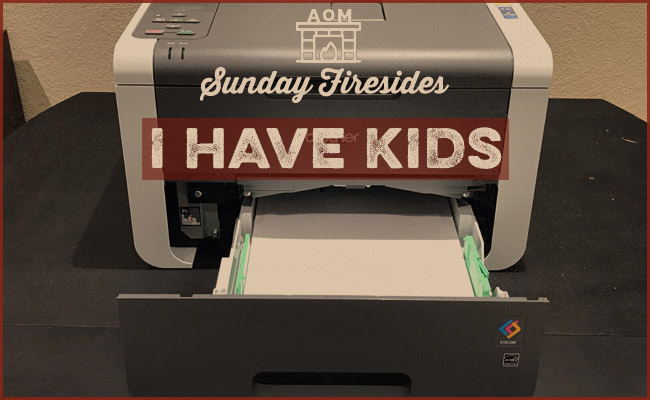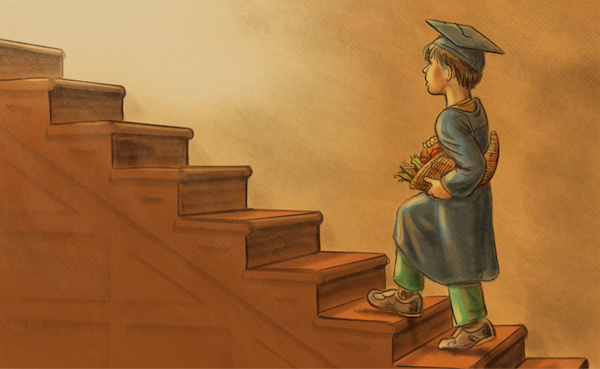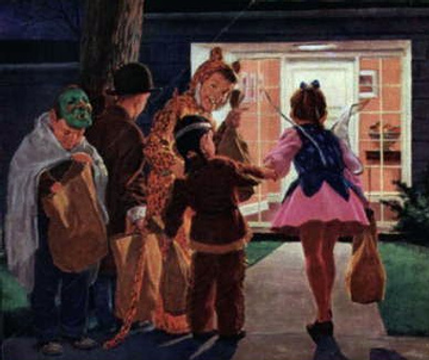
With our archives now 3,500+ articles deep, we’ve decided to republish a classic piece each Sunday to help our newer readers discover some of the best, evergreen gems from the past. This article was originally published in November 2019.
According to a survey cited by psychology professor Robert Emmons, when parents were asked what they worried about most regarding their children, the majority didn’t name drugs, sex, global warming, political crisis, or the economic future.
Instead, two-thirds of parents said their primary concern about their kids was their sense of entitlement.
They’re right to worry. A sense of entitlement breeds a number of negative qualities: envy, resentment, selfishness, greed, petulant indignation, laziness, detachment, and a lack of resilience.
Entitlement can be caused in part by kids being given too much, too easily — being spoiled, without having to work for their largesse. Yet everyone knows poor kids who still feel entitled, and rich ones who don’t.
The central factor in entitlement is thus not the amount of good stuff in a child’s life, but his or her attitude toward that stuff.
Entitlement is essentially ingratitude, and gratitude is thus its antidote. Where entitlement says, “I’m owed that,” gratitude says, “The world doesn’t owe me anything.” Where entitlement says, “I deserve this,” gratitude says, “Everything I get is a gift.”
Whereas entitlement is the origin of many vices, gratitude, as Cicero said, is the greatest of virtues, because it is the fount of all the rest. The research-backed benefits of gratitude read like a laundry list of everything parents most desire for their children: in terms of physical health, it boosts the immune system and improves sleep; in terms of mental health, it bolsters resilience to stress and lowers depression; in terms of character, it strengthens the qualities of humility, compassion, forgiveness, and generosity, as well as feelings of closeness and connection to others. Humans who feel grateful, whether young or old, want to give back by being better people and supporting others. In a study done by Emmons, the leading scientific expert on gratitude, he found that “kids who were more grateful than their peers at age ten were, by age fourteen, undertaking more community activities and were more socially integrated.”
The fortunate thing about gratitude is that it not only comes with all these benefits, it isn’t, as we often think, just a feeling — something that spontaneously happens to you. Rather, it is more like a skill, something you can intentionally practice, get better at — and develop in your children. Today we’ll take a look at how.
How to Develop Gratitude in Your Kids
Emmons defines gratitude as having two parts: “(1) affirming goodness in one’s life and (2) recognizing that the sources of this goodness lie at least partially outside the self.” The following methods of instilling gratitude in your kids work on both prongs of the equation.
Prompt them to say “Please” and “Thank you.”
This is the simplest of fundamentals, and a habit that sets a child up to have gratitude interwoven in all of their daily interactions for the rest of their lives. The connection between “Thank you” and gratefulness is clear; “Please” also works toward it by diminishing the demanding attitude which marks entitlement.
You should start prompting your kids to say “Please” and “Thank you” from an early age, though Emmons notes that “most children don’t manage to produce [these phrases] spontaneously until sometime between the ages of four and six.” It may take hundreds of “What do we say’s?” before they get the habit down themselves; just keep up the consistent nudges.
Prompt them to think outside themselves.
Kids are intrinsically egocentric creatures. They feel like the world revolves around them, and don’t often think about the sacrifices which are made by those who create that world for them. Parents can help prompt their children to look beyond this narrow view and think more about things from the perspective of their “benefactors.”
In a study done by Emmons, he found three techniques were effective in doing this:
- Point out intentions: From a child’s (or an immature adult’s!) perspective, of course things are done for them. Of course things are set up for them, given to them. Regularly take the time to point out that, in fact, this isn’t the case — that things did not happen by accident, by chance, or by natural course, but that someone intentionally made them happen for him or her. “Mom was able to find the right color shirt because she deliberately went to three different stores, knowing how important it was to you.” “Your friend shared his computer on purpose, so you didn’t feel left out.” “It’s sure nice the waiter found your glasses; that’s not part of his job.” “Your teacher stayed after school to help you with your homework, not because she enjoys tutoring, but because she wanted to help you understand the problem.”
- Ask about cost: Have an ongoing discussion with your kids about the fact that when people choose to do something for them, they have to sacrifice something else — their time, money, personal preferences, etc. “What did your brother give up by taking you to the movies tonight?” “What do you think your Sunday school teacher gives up to prepare your lessons each week?”
- Ask how much X helped you: Kids should be taught to strive for a healthy level of self-sufficiency while humbly acknowledging the ways they are, like all humans, also dependent on others (as children, almost entirely so!). Help them recognize this fact by asking things like, “How much did your friend help you with your homework?” “How much did Dad bringing your notes to school help with your class?”
Emmons’ study found that giving kids any of these prompts resulted in their having feelings of greater happiness and being more likely to express gratitude to others.
Expect them to write thank you notes.
Gratitude isn’t just a feeling to be experienced, but a moral virtue to be expressed. Saying “Thank you” is nice, but when someone does something from a distance and can’t be thanked in person (e.g., Grandma sends a gift) or does something extra special for your child, a verbal thank you isn’t sufficient and a written note is appropriate. Not only will its recipient appreciate knowing that their gesture/gift was received and enjoyed, but the effect boomerangs back on the writer; studies show that both children and adults who pen thank you notes experience greater levels of happiness and gratitude.
Get your kid into the thank you note habit as early as possible, tailoring your expectations for the form the note should take according to their age and cognitive/writing abilities; here are some general suggestions:
- 3-6 years old: The child can draw a picture and/or scrawl a scribble, and kids on the older side of this range can sign their name. The parent talks about why they’re making the note, adds a short written thank you message to their child’s creation, and addresses the envelope.
- 7-9 years old: The child writes a very short, simple, 1-2 sentence thank you message — “Thank you for the gift” — and signs it. The parent may address the envelope if the child is on the younger end and his handwriting is still questionably legible.
- 10+ years old: The child can add a few sentences to their simple expression of gratitude, describing what they liked about the gift or plan to do with it and perhaps a bit of what’s new in their life in general. The child can address the envelope.
Encourage your kids to write their thank you notes sooner after receiving a gift/gesture, rather than later.
Talk about their genealogy.
Nobody can truly be a self-made man, who’s earned everything’s he’s got, as the very fact he exists is premised on the existence of his ancestors. His life has been built on the scaffolding of those who’ve come before.
Teaching your kids that they’re part of a story much larger than themselves can reduce their egocentrism and sense of entitlement, allowing them to see their lives as more of a gift. Perhaps that’s why research has shown that one of the best predictors of a child’s emotional health and happiness is their ability to answer questions about their family history.
So share stories with your kids about their grandparents, great-grandparents, and on back. Talk about what you’ve been learning about your family history from doing your own genealogical research.
Encourage grateful contemplation.
Part of why humans young and old are bad at gratitude is that our brains are wired for negativity. Positive moments slide off our minds like Teflon, while negative stuff sticks like Velcro.
To counteract this phenomenon, it’s helpful (for parent and child alike), for Mom and Dad to encourage greater reflection on and absorption of the good things — big and small — that happen in life. While taking a walk, you can say, “Wow! Let’s stop for a moment and really look at this sunset. It’s beautiful.” While leaving Grandpa and Grandma’s house, you can remind them, “Isn’t it nice your grandparents live close by? Some kids’ grandparents live all the way across the country and they only get to see them a couple times per year.” Prompt your kids to let positive moments soak into their brains a little more.
You can also move gratitude to the forefront of your children’s minds by asking them to name something they’re grateful for when they come home from school, you’re sitting around the dinner table, or you’re tucking them in at night.
Do service together.
Gratitude produces the feeling: “In light of all I have been given, how can I not give back?” Invite your children into this feeling by involving them in acts of service. Work at a food bank together (kids can often pitch in starting around age 12); have them come with you to help clean up an elderly neighbor’s yard; pick up trash together at a local park; have them help pick out toys (either new or gently used from their own collection) to donate to the toy drive; ask if they’d like to contribute a little of their money to a charity.
Model grateful behavior.
In the survey cited at the start, of the parents who worried about their kids’ sense of entitlement, 85% blamed themselves for creating it.
Parents can combat rather than enable entitlement, by being an example of the grateful behavior they want to see in their children. In my podcast interview with Emmons, he noted that one of the questions he’s asked most is: “How can I get so-and-so to be more grateful?” His answer?
“You become a role model for those people around you”:
there are a few studies looking developmentally with parents and kids. They find that the best predictor of a child’s gratitude is the mother’s or the father’s gratitude. Then, it’s the expression of gratitude within the family, so becoming a role model, and then encouraging gratitude, reinforcing gratitude when you see it in your children are some of the best ways in which you can raise a grateful child.
Spouses’ should thank each other for everything, even for the routine chores that are “expected” of them; say “Thank you for making dinner,” “Thank you for doing the dishes,” “Thank you for taking out the trash,” even when it happens every day; remember, no one inherently deserves anything; it’s all a gift. Let your kids also overhear you thanking the waiter, the cashier, the flight attendant. Let them see you writing your own thank you notes.
Give credit and praise to others too. When celebrating a success, talk to your kids about the other people who helped make it happen: “I’m proud of this, but I couldn’t have done it without ____!”
If you want grateful kids, watch whether you yourself approach life with an attitude of getting what you’re owed, or being delighted with what you’re gifted. As Emmons observes, gratitude “is more often caught than taught.”
Be sure to listen to our podcast with Dr. Emmons all about gratitude:
Sources:
Gratitude Works! By Robert A. Emmons
The Little Book of Gratitude by Robert A. Emmons







